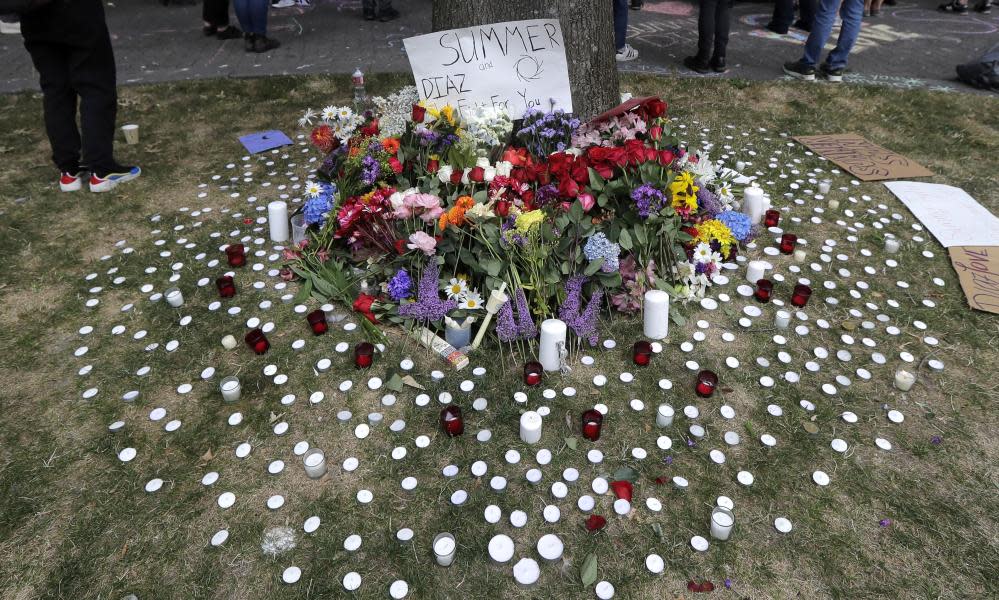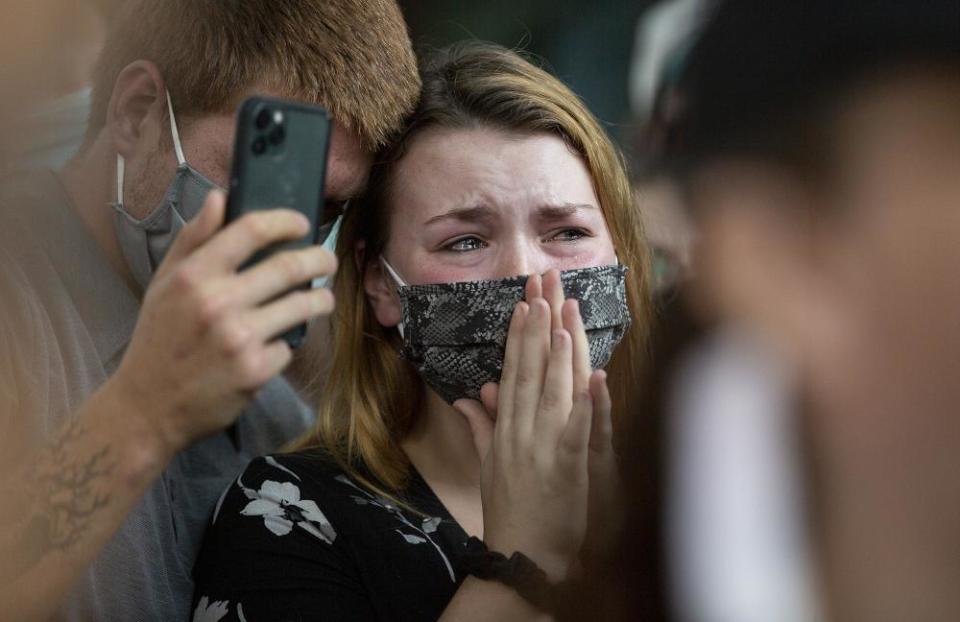At least 25 Americans were killed during protests and political unrest in 2020

At least 11 Americans have been killed while participating in political demonstrations this year and another 14 have died in other incidents linked to political unrest, according to new data from a nonprofit monitoring political unrest in the United States.
Nine of the people killed during protests were demonstrators taking part in Black Lives Matter protests. Two were conservatives killed after pro-Trump “patriot rallies”. All but one were killed by fellow citizens.
Related: America's protest crackdown: five months after George Floyd, hundreds face trials and prison
The new data highlights the danger of the presence of guns during politically charged protests, and raises concerns about continued violence during and after election day, when many Americans anticipate delays, confusion and protests before the winner of the presidential race is confirmed.
Violence at US protests
The new data on fatalities and violence at American protests comes from a database created by the Armed Conflict Location and Event Data project (ACLED), a nonprofit, working in collaboration with a group of researchers at Princeton.
ACLED, a widely-cited source for data on civilian casualties in Yemen, has been a nonpartisan monitor of protests and violence in the Middle East, Asia, Europe and Latin America, and launched its US Crisis Monitor in July, citing concerns over hate crimes and rising political violence.
ACLED found that the overwhelming majority of the more than 9.000 Black Lives Matter demonstrations that took place across the US after the killing of George Floyd have been peaceful. News reports at the height of demonstrations over Floyd’s killing cited dozens of deaths in connection with protests, but many of those turned out to be examples of deadly crimes carried out in the vicinity of protests, rather than directly related to the demonstrations themselves, the researchers concluded. ACLED’s dataset only focuses on political violence.

Most of the protesters killed this year were shot to death, and many of the incidents involved confrontations at protests that escalated and turned deadly when at least one of the people involved had a gun.
Lee Keltner, a navy veteran who made custom western hats, was shot after a “patriot rally” in Denver on 10 October. Video and photographs of the incident appear to show Keltner slapping a security guard for a local news crew, who responds by pulling out a gun and shooting him.
Aaron “Jay” Danielson, a far-right Trump supporter, was shot after a rally in Portland in August. Danielson’s suspected killer, Michael Reinoehl, was a leftwing protester who called himself an “anti-fascist,” and who was later shot to death by law enforcement officials, an outcome Donald Trump referred to as “retribution”.
Garrett Foster was reportedly carrying an AK-47 rifle when he was shot to death in July by an armed man who had been driving a car through a crowd of Black Lives Matter protesters in Austin. Whether Foster threatened the driver with his gun is still disputed. The man who shot and killed Foster, the US army sergeant Daniel Perry, had previously tweeted “Now is the time to take up arms and protect yourselves against violence” and responded to a Trump tweet in June about “protesters, anarchists, agitators, looters” by saying, “Send them to Texas we will show them why we say don’t mess with Texas.”

Citing those tweets, analysts at a thinktank that monitors domestic terrorism classified the shooting as an act of “violent far-right” domestic terrorism. But Perry has not yet faced any criminal charges, and a local prosecutor in Texas said the incident is still under investigation.
Both Reinoehl and Perry have claimed they were acting in self-defense when they opened fire and that they felt that their own lives were in danger.
In Kenosha in August, a 17-year-old carrying a rifle he was not old enough to legally possess shot and killed two people, Joseph Rosenbaum and Anthony Huber, and seriously injured a third at a volatile late-night protest. His lawyer has argued the teenager, who came to Kenosha from Illinois, was also acting in self-defense.
In Louisville, the photographer Tyler Gerth was shot and killed at a downtown park where protesters gathered. The alleged shooter, Steven Nelson Lopez, was homeless and had a history of severe mental illness, and had reportedly been asked to leave the park earlier because of his behavior. Many of the protesters in the park were armed and on edge, and returned fire when Lopez started shooting, local news outlets reported.
In Las Vegas, Jorge Gomez was wearing body armor and carrying several guns when he was shot to death by Las Vegas police at a protest in June. Before he was shot, several protesters told Gomez they disapproved of him being armed, and even a journalist questioned him about why he was holding his gun in his hand with his finger on the trigger, the Las Vegas Sun reported. Las Vegas police officer Shay Mikalonis was shot in the head during the same protest, and reportedly remains paralyzed from the injury. Officials have said the 20-year-old Las Vegas resident charged in the shooting had not been participating in the protest before the attack, the Las Vegas Review-Journal reported.
Other law enforcement officers have been injured in nonfatal shootings this year, including two Los Angeles sheriff’s deputies shot in Compton while sitting in their patrol car in mid-September, and two Louisville police officers shot in late September during a protest over the lack of serious charges against police officers in Breonna Taylor’s killing.
James Scurlock, a Black Lives Matter protester with an infant daughter, was shot to death in Omaha in May after a confrontation with a white bar owner outside the man’s bar.

Other demonstrators died when cars drove through or rammed into crowds of Black Lives Matter protesters. Summer Taylor, a Black Lives Matter protester who worked in a veterinary clinic, was killed in such an incident in Seattle. So was Robert Forbes, a black protester from Bakersfield whose sister recalled him demonstrating decades earlier over the brutal police beating of Rodney King. In St Louis, Barry Perkins, a father of two, was killed after being dragged and run over by a FedEx truck during a protest in May.
Killings amid political unrest
In addition to the people killed while demonstrating, at least 14 more Americans have been killed in other incidents linked to political unrest this summer, including seven people shot during alleged looting of businesses, among them David Dorn, a retired police officer shot during the robbery of a pawn shop in St Louis; two California law enforcement officers murdered by an alleged anti-government “Boogaloo” extremist, one person found dead in a pawn shop in Minneapolis that had been set on fire; an eight-year-old shot to death in Atlanta; and a Louisville restaurant owner who was shot dead by the national guard.
Some of those killings remain unsolved.
One of two fatal shootings of young black men in Seattle’s self-declared “Capitol Hill Autonomous Zone” was not politically motivated, according to ACLED’s review of details in the case, but the June shooting of Antonio Mays Jr, a 16-year-old, was found to be connected to the broader unrest. A Seattle Times review of footage linked to the chaotic scene of the shooting suggested that some people in the protest zone might have believed they were under attack when they fired their guns at the stolen Jeep Mays and another young teenager were driving into the zone.

Jessica Doty-Whitaker, a white woman, was shot to death early one July morning in Indianapolis. Her fiance told media outlets that her shooting had been preceded by a tense argument with some passerby about the use of a racial slur and the statements, “Black Lives Matter” v “All Lives Matter.” While they walked away from that confrontation, the fiance said, someone opened fire later and the 24-year-old mother was killed. Indianapolis police have not verified those claims or released any details about the circumstances of the shooting, and no one has been charged, but ACLED categorized the shooting as potentially politically motivated.
Victor Cazares Jr was described by friends and family as a supporter of Black Lives Matter. On 1 June, a day of widespread protests across the country, he was shot to death outside a neighborhood grocery store in Cicero, Illinois, that he was reportedly trying to protect.
While a Chicago resident was quickly charged in the shooting death of another man, Jose Gutierrez, that same day in Cicero, the Cicero police department did not respond to requests for comment about whether anyone had yet been charged in Cazares’ death.
“He was just standing there making sure that everybody is OK,” Cazares’ sister told the Cicero Independiente. “He wasn’t there to cause any violence. He didn’t even have a weapon.”


